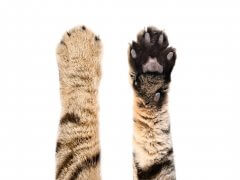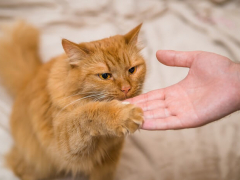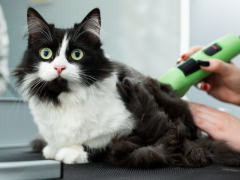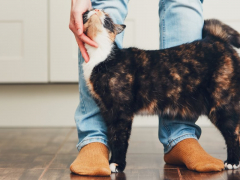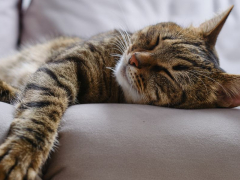By now you’ve probably heard the news that a small number of cats have caught COVID-19. Other felines including lions and tigers at the Bronx Zoo caught this novel coronavirus too, presumably from asymptomatic caretakers.
There’s a lot we don’t know about this virus. And as the situation progresses, new knowledge will come to light. What we do know is that cats are vulnerable to COVID-19.
You Can Give A Cat Coronavirus, But Can Cats Spread Covid-19?
We’ll start here as a way to put any fears to rest: For now, there is no evidence that cats can spread COVID-19 to humans.
The world’s leading health authorities including Centers for Disease Control (CDC) and World Health Organization (WHO) join the American Veterinary Medical Association (AVMA) in reassuring pet parents everywhere that we don’t need to worry about pets spreading COVID-19 to humans.
In fact, your pet can be a grounding, joyful presence in your life, especially now.
People can give COVID-19 to cats. One cat in New York caught coronavirus from an owner who had tested positive. Another is believed to have contracted coronavirus outside the home as no one in the family had the virus.
Cats can spread COVID-19 to one another. The New England Journal of Medicine recently published a report detailing how cats with COVID-19 can transmit the virus to other felines. This report raised questions about whether or not cats can act as silent intermediate hosts, carrying this coronavirus from one human to another. The most likely scenario though, is that a cat with COVID-19 could easily transmit the virus to another cat in the same home, or to another cat in the neighborhood.

It’s Important To Keep Your Cat Safe.
Since cats can catch COVID-19, they should practice social distancing from people and pets who aren’t members of your household. You can start by keeping your cat indoors at all times if possible.
This can be difficult if you have one of those tricky indoor / outdoor cats that really, really wants to roam the neighborhood, but their health needs to come first.
Try to confine that cat to an interior room when you know an outside door will be opened. Your cat won’t understand why they’ve been placed on lockdown, but their risk of contracting COVID-19 from another outdoor cat will be minimized.
Here Are More Ways To Keep Your Cat Safe During The Covid-19 Pandemic:
Create an emergency plan for their care in case outside help is needed. Find someone who is willing to be your cat’s emergency caretaker and provide them with information about your cat’s routine in advance. Keep their contact information with you in case of emergency, and ask them to let you know if their availability changes.
Put together an emergency kit containing all the essentials your kitty will need for at least 30 days. Cat food, bedding, toys, litter, and copies of your pet’s medical records are some things to include.
Sanitize any new toys when they arrive and allow them to dry completely before giving them to your pet.
Caring For Your Cat When You Have Covid-19
If you suspect that you have COVID-19, or if you test positive and are self-isolating, try not to have close contact with your cat.
If you are your cat’s sole caretaker, consider keeping your cat in a separate room. Think about wearing a mask and gloves while caring for your cat. Sanitize all the surfaces you touch in the room where they are staying.
If you have COVID-19 and others in your household are caring for your cat, the CDC recommendations are to try to remain quarantined, away from your cat. Not only is this one more way to protect your pet, it’s a way to minimize potential transmission of viral particles that could potentially cling to your pet and travel to other members of your household.
In case your cat is injured or ill and you have COVID-19, someone else should transport your cat to the vet for you, or you might be able to handle the situation via telemedicine.
Your Vet May Be Open, But With Restrictions.
Veterinarians and their staff members are designated essential personnel, and many clinics remain open for urgent care, necessary vaccinations, and surgery.
If your cat needs a non-emergency procedure, it might need to be postponed. Talk to your vet about next steps as patient care will take place on a case-by-case basis. Any social distancing protocols for in-person visits will be discussed when you talk via phone or video call.
Your Routine Is Important.
Even though some things might be in short supply at your local pet store, you can probably shop online for your cat’s favorite food and the litter they like. New toys, medicines, flea control, and other essentials can be purchased online, too.
If you’re staying home, now is a great time to bond with your cat, spend extra time playing, and of course, catch up on those naps. If you’ve thought about adopting another pet, now might be the ideal time to make them part of your family.
In case you’re an essential worker, thank you! Your cat might need a little extra attention during the limited amount of time you get to spend at home.
Final Thoughts
These are interesting times, for certain. It’s vital to stay up to date as new information develops and it’s equally important to hold our loved ones as close as we can. As companions and confidants, our pets can help us get through; and in turn, we can help them stay safe and happy.

